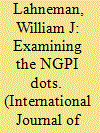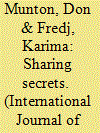| Srl | Item |
| 1 |
ID:
124002


|
|
|
|
|
| Publication |
2013.
|
| Summary/Abstract |
National intelligence is still organized around the collection disciplines of the home agencies, not the joint mission. The importance of integrated, all-source analysis cannot be overstated. Without it, it is not possible to "connect the dots." No one component holds all the relevant information.
The 9/11 Commission Report, 22 July 2004, p. 408.
Although the 9/11 Commission Report 1 is over 400 pages long, its catchphrase about the Intelligence Community's (IC's) failure to "connect the dots" most succinctly captures one of the principal things that went wrong with the U.S government's efforts in general, and the IC's attempts in particular, to detect al-Qaeda's attack plans. General agreement prevails that the chance of detecting al-Qaeda's plans would have been improved if the IC had been able to pool, fuse, and analyze all of the relevant information about al-Qaeda's plans that various U.S. government agencies possessed prior to the attacks. As a result, the Commission strongly emphasized the need to improve information sharing across multiple IC and other government agencies to improve the IC's chances of detecting future attacks.
|
|
|
|
|
|
|
|
|
|
|
|
|
|
|
|
| 2 |
ID:
124004


|
|
|
|
|
| Publication |
2013.
|
| Summary/Abstract |
To enhance contemporary intelligence, more thinking should be aimed at turning research and knowledge into use. 1 The principle is that research work and its knowledge can readily be turned into a more purposeful and relevant contribution to overall intelligence activities. In both qualitative and quantitative terms, that research-originating contribution can be better applied in overarching "all-source" intelligence efforts.
|
|
|
|
|
|
|
|
|
|
|
|
|
|
|
|
| 3 |
ID:
123999


|
|
|
|
|
| Publication |
2013.
|
| Summary/Abstract |
The United States Intelligence Community (IC) has had more than a decade to reflect on its failure to predict the catastrophic events of 11 September 2001 (9/11). Nearly as much time has passed since the IC's mischaracterization of Iraq's weapons of mass destruction (WMD) program, a mistake that led to the costly expansion of what became the war on terrorism. More cause for recrimination followed when key U.S. decisionmakers seemed to fundamentally misunderstand what was required to pacify Iraq and Afghanistan. The wars in both countries hit repeated snags that should have been seen going in. How could the intelligence analysts who were supposed to have briefed U.S. leaders on the risks of these undertakings have left their audiences so poorly informed?
|
|
|
|
|
|
|
|
|
|
|
|
|
|
|
|
| 4 |
ID:
124003


|
|
|
|
|
| Publication |
2013.
|
| Summary/Abstract |
In the dozen years since 11 September 2001, intelligence curricula have cropped up at scores of colleges and universities around the United States and in other countries. Accompanying this growth has been a growing literature that describes and examines various aspects of these programs. Enough time has elapsed-and a critical mass of empirical and normative analysis reached-to permit an inventory of the research on academic intelligence education in the U.S. Much of the academic intelligence education "market" has been mapped. Myriad, unreconciled perspectives have emerged. The time has arrived to map the research market and consider where (and how) the discipline might go from here in order to better the existing programs and the graduates they produce.
|
|
|
|
|
|
|
|
|
|
|
|
|
|
|
|
| 5 |
ID:
124001


|
|
|
|
|
| Publication |
2013.
|
| Summary/Abstract |
Radical apocalypticism (RADAP) is a belief system, usually religious, that provides a logical framework for violent action in order to help usher in a new world order. Leaders with RADAP thinking have a distinct reasoning framework that significantly changes traditional cost-benefit calculations. It is thus imperative that analysts consider this plausible influence when evaluating Iran's nuclear weapons intentions. Yet, with a few exceptions, past and present analyses of Iran's nuclear situation have typically ignored the role of religion in shaping its leaders' political decisions.
|
|
|
|
|
|
|
|
|
|
|
|
|
|
|
|
| 6 |
ID:
124000


|
|
|
|
|
| Publication |
2013.
|
| Summary/Abstract |
During the lead-up to the 2003 invasion of Iraq, the governments of the United States and United Kingdom jointly made public a range of previously secret intelligence to bolster claims that Saddam Hussein's regime had continued to pursue development of weapons of mass destruction. Public releases of intelligence information are less rare than often assumed, but the Iraq case was definitely unusual in that both governments implicitly revealed their close cooperation.
|
|
|
|
|
|
|
|
|
|
|
|
|
|
|
|